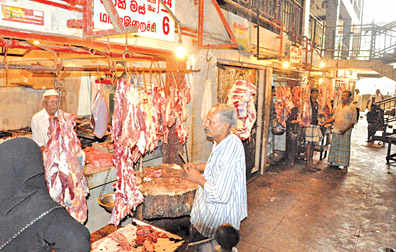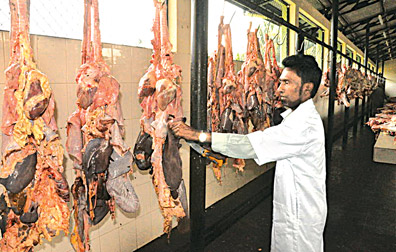Is your meat chop fit for consumption?
By Ranil WIJAYAPALA

Meat stalls in public market in the city |

Meat being inspected at the Dematagoda slaughter house |
|

Dr. S.D. Eleperuma
|
Colombo city folk have to be extra vigilant when buying meat from
stalls in the public markets, farm shops and supermarket chains in the
city just like the way they must be extra careful when consuming cooked
meals from city food outlets.
It is the duty of city administrators to give that guarantee to
consumers after adopting a long process at the city slaughter house and
at public markets.
A very strict safety net is in place in the city to inspect,
supervise and monitor the sale of meat to assure consumers that what
they buy in stalls in public markets, farm shops and super market chains
are fit for consumption.
Colombo city had its slaughter house at No.246 and No.247 Baseline
Road, Dematagoda to cater to the beef, pork and mutton demand of city
dwellers since 1868- soon after the commencement of the Colombo
Municipal Council- the cattle slaughter house at Dematagoda was closed
in 1990.
The goat and pig slaughter houses at Dematagoda however continued
functioning under the Municipal Veterinary Department of the Colombo
Municipal Council.
Butchers Ordinance
According to Dr. S.D. Eleperuma, the Chief Municipal Veterinary
Surgeon the centuries-old Butchers Ordinance and the over 75 years old
Animals Act are two legal enactments in force to monitor and supervise
slaughter of animals for human consumption.
The Butchers Ordinance was passed in the 1800's had its last
amendment in 1958 and the Animals Act too had its last amendment in
1958. Some regulations under the Animals Act were passed in the 1980's.
"The Butchers Ordinance has laid down its procedure on the issue of
licences, for the establishing of slaughter houses, selling meat and
opening meat stalls", Dr. Eleperuma said.
The Animals Act provides for the kind of animals to be slaughtered
for the purpose of meat. Cattle, goats and pigs are permitted under the
Animals Act as animals that can be slaughtered for meat. "But chicken is
not defined by the Act as an animal that can be slaughtered", he said.
Although there are no restrictions imposed on slaughter of pigs and
goats for meat, strict conditions have been laid down in the Animals Act
on the slaughter of cattle.
According to the Animals Act, male cattle irrespective of age and
cows above 12 years are permitted to be slaughtered. Infertile cows and
those which cannot be used for agricultural purposes could also be
slaughtered for meat.
All animals have to be certified by a qualified government veterinary
surgeon before being slaughtered. Whether the animal is over 12 years,
infertile or capable of being used for agricultural purposes have to be
gone into before permission for slaughter is granted.
In 1978, the Cabinet decided to impose a complete ban on the
slaughter of female cattle. The decision was however reversed in 2002.
Dr. Eleperuma said that due to the poor state at the Dematagoda
cattle slaughter house cattle slaughtering in Colombo was stopped in
1990.
"The difficulty in transporting animals to Colombo was another reason
for this decision", Dr. Eleperuma added.
Although the slaughter of cattle has been stopped the demand for beef
increases daily.
"In the early 1980's nearly 125 head of cattle was slaughtered daily
except on Poya Days. Apart from this nearly 250 goats and 35 to 40 pigs
were also slaughtered daily", Dr. Eleperuma said.
The CMC, however had a very strict methodology in place to supervise
and monitor the supply of beef to the Colombo city.
Section 35 of the Municipal by-laws stipulates the procedure for
administering, monitoring and supervising of slaughter houses.
The slaughter of animals for meat at the CMC slaughter house has to
be carried out under the supervision of the municipal veterinary
surgeon.
The meat of the animals which are slaughtered at the slaughter house
has to be inspected by the municipal veterinary surgeons and stamped to
ensure that the meat has been certified by the veterinary surgeons. They
pay the fee determined by the Council and take meat to their stalls when
the pass is issued.
"Nobody can carry meat within the city of Colombo without a permit
from the slaughter house as it is a legal requirement", Dr. Eleperuma
said.
The same chapter of the municipal bylaws clearly states that the
Chief Municipal Veterinary Surgeon may permit the sale of meat from any
approved slaughter house in the country.
"A licensed butcher has to seek permission from the Veterinary
Department to take the meat to the Colombo city.
Once permission is obtained they have to bring the meat from
outstations to the Colombo slaughter house for re-inspection", he said.
The meat is brought to Colombo and reinspected by the CMC Veterinary
surgeons and the same procedure is repeated.
"The amount charged is 12 cents per kilo for reinspection. Then the
carcass is sealed to certify that the meat is fit for human consumption.
A pass is issued to take the meat to the stalls", Dr. Eleperuma added.
He said they follow very strict methods to ensure that slaughter
houses from where the meat is brought are legal ones maintaining proper
standards when slaughtering animals after visiting those places.
"Beef to the city is supplied from the CMC approved slaughter houses
in Welisara and Ja-Ela in the Gampaha district and in Kurunegala,
Puttalam and Anuradhapura", he said.
When permission is granted to bring beef to the city, the applicant
is asked to produce the licence from the slaughter house, a letter from
the MOH of the area to prove that the animals which are slaughtered are
approved by the PHI of the area.
Seal
They have also been asked to produce ante-mortem and post-mortem
reports of the animal slaughtered. The MOH issues a letter to the CMC
along with a specimen of the seal which is being used on the meat, the
specimen signature of the PHI who signed the fitness certificate plus
the rubber stamp.
It is only after receiving all these approvals that the CMC
Veterinary Department permits to allow meat to be brought from other
slaughter houses.
At the reinspection process at the slaughter house at Dematagoda, the
veterinary surgeons there also remove some parts of the meat which are
not fit for human consumption.
The veterinary surgeon reinspecting cuts and chops and removes (on
daily basis) about 150 kilos that is unhealthy for human consumption.
Only beef
"Only beef comes from outside. But for mutton and pork, animals are
slaughtered in the slaughter house at Dematagoda under our supervision",
Dr. Eleperuma said.
This has been the practice for the past 20 years and beef is supplied
to Colombo from 15 slaughter houses. "By this process an assurance is
given that the meat available for sale in the Colombo city is good,
clean and healthy", Dr. Eleperuma added.
"At present about 18,000 Kgs of beef is brought to Colombo city and
we slaughter on average a 100 head of goats and 50 pigs daily at the
slaughter house", Dr. Eleperuma added.
The meat supplied to the city is sold at 123 meat stalls - 63 beef
stalls, four pork stalls and 25 mutton stalls at 20 public markets.
Chicken is sold at 31 chicken stalls. In addition 30 private meat stalls
and over 25 supermarkets also sell meat in the city."Nobody could sell
any meat without permission from the Colombo Municipal Council. Even
private meat stalls and the supermarkets should obtain a licence from
the CMC to sell meat.
The eight veterinary surgeons at the Veterinary Department of the CMC
visit the city markets to inspect meat stalls.
"I am very happy that no illegal meat is now brought to the city. We
are on the alert and errant butchers are dealt with according to
Municipal regulations", he said.
"We take legal action according to the by-laws. Illegal meat detected
at the markets will be destroyed at the slaughter house. Where necessary
the stall will be ordered to be closed for three days.
"The law applies to all equally. Meat should be supplied to the city
from outside only with permission from municipal authorities. Stern
action will be taken against defaulters", he said.
Following a tip off the municipal veterinary surgeons seized a
consignment of meat worth over Rs. 75,000 from a meat stall in Colombo
North recently.
"They brought the beef from an approved slaughter house directly to
the stall by-passing the municipal slaughter house at Dematagoda", he
said.
Chapter 14 of the Municipal by-laws state that meat which is not
processed at a licensed slaughter house is illegal. It should also have
been inspected by the authorities which is a legal requirement.
"Unfortunately, chicken is not subjected to this process although we
have live poultry stalls and farm stalls to sell chicken in the city. In
Colombo's public markets we have 20 live poultry shops", he added.
Farm shops have become attractive business centres. We have nearly 60
approved farm shops in the city. Farm shops are not supposed to sell
live birds. They can slaughter live birds elsewhere and bring the meat
either in packeted or unpacketed form.
"However, they need to have a chiller or freezer in the farm shop.
They should display and stock the meat in the chiller or freezer. It
is a similar process as in the supermarkets. The law does not cover the
inspection of chicken", he said.
The CMC has adopted a strict procedure to ensure that the meat
products sold within the city are fit for human consumption.
|
Tips for consumers on
buying meat
* Avoid going to the stalls
early morning. The butchers generally sell all additional
stuff in a chunk in the morning. Fresh meat has more water
in it.
* Go to the meat stalls in
the evening if you prefer a better chunk of meat. The water
content is 80 percent in fresh meat. Evaporation takes place
in the chunk of meat with time. With the passage of time
more water gets evaporated. When you buy meat in the evening
you get less water and more meat.
* In a country such as Sri
Lanka the temperature is comparatively high. Any meat that
is slaughtered in the morning can be kept hung without
freezer or ice, till the following morning. With the passage
of time the pink colour becomes a little darker. But this is
not a sign of spoilage. It turns dark with chemical reaction
with oxygen in the environment. When the water evaporates
the colour of meat gets darker. When the meat is kept
hanging for 24 hours three percent of water evaporates. |
|

